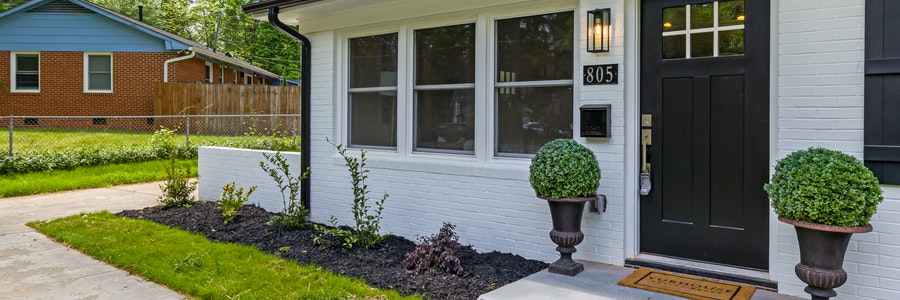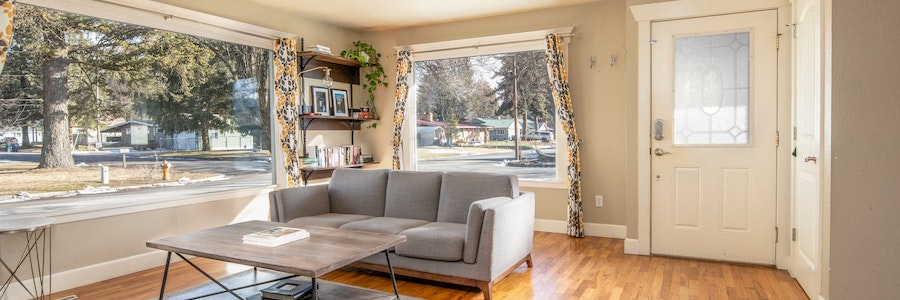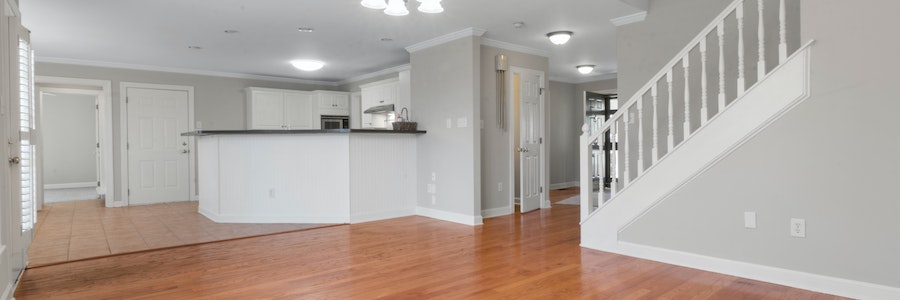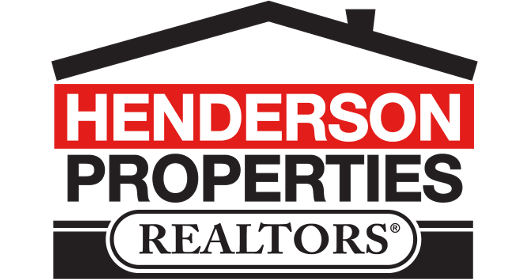How To Maximize Your Home Sale In Charlotte
So, you’re thinking about selling your home. Congratulations! This decision is a significant and exciting step, whether you’re upsizing, downsizing, or just moving to a new location. But before you list your home on the market, you might have a few questions about the process.
Here are a number of the most frequently asked questions from home sellers and their answers:
Q: How can I be sure I’m ready to sell?
A: A few things to consider before you list your home on the market. First, think about your financial situation. Are you in a stable position to afford a new home? If you’re selling your current home to buy a new one, you’ll need to factor in the costs of selling (agent commissions, staging, etc.) and purchasing a new home. You’ll want to think about your timeline; are you looking to sell quickly, or do you have some flexibility? Knowing your financial situation and timeline, you can better work with your real estate agent to determine the ideal time to sell.
Q: What are the unexpected costs of selling a home?
A: There are a few different costs associated with selling a home. First, there are agent commissions; typically, sellers pay around 6% of the final sale price in commissions, which splits between the buyer’s and seller’s agent. There could be additional costs for staging, repairs, and marketing. Your real estate agent can give you a better estimate of the costs associated with selling your home.
Q: How do I find the right real estate agent?
A: When you’re ready to sell your home, you must find a real estate agent you can trust. Ask people you trust for recommendations, or look for agents with good online reviews. Once you’ve found a few agents you’re interested in working with, interview them to get a better idea of their experience and what they can do for you. Ask about their marketing plans, past sales, and what they think your home is worth.
Q: How do I ready my home for sale?
A: Before you list your home on the market, you’ll want to do some preparations. First, give your home a deep clean, get rid of clutter, and make sure everything is sparkling clean. Next, you might consider making cosmetic updates, like painting the walls or updating the hardware. These small changes can significantly affect how quickly your home sells. Finally, you’ll want to stage your home; by arranging furniture and decor in a way that’s appealing to buyers, you can make your home more attractive and increase the chances of a quick sale.
Q: How do I price my home?
A: One thing is for sure, home pricing is not an exact science. Many factors go into pricing a home, including the location, property condition, recent sales in the area, interest rates, market temperature, and more. A real estate agent can typically provide a comparative market analysis (CMA) to help you price your home. This report will look at recent sales in your area and give you an idea of what buyers are likely to expect to pay for a similar property.
Q: Is a professional home inspection worth the money?
A: While not required, investing in a professional home inspection before listing your home can save you headaches and potential complications later. Unless you plan on selling your home on an “as-is” basis, getting an inspection can allow you to make repairs the inspector could find during the buyer’s inspection. For instance, if your home inspector sees that your furnace is on its last legs, you can either replace it or offer a credit to the buyer. In addition, you can avoid costly sales delays by getting ahead of any potential problems.
Q: What is the timeline for selling a house?
A: The timeline for selling a home can vary greatly. And while not always the rule, homes in high-demand hot markets sell much faster than homes in slower markets. Other factors, such as overreaching market conditions, can impact the timeline for selling a home. That said, most homes will spend an average of 30 to 45 days on the market before selling. Your real estate agent can better estimate how long it will take to sell your home based on their experience and knowledge of the local market.
Q: What are common negotiation tactics used by buyers?
A: While buyers’ negotiation tactics are changeable, lowballing is common. Lowballing is when a buyer makes an offer significantly lower than the asking price in hopes of getting the seller to accept. Another common tactic is c “chipping away.” In this case, the buyer attempts to get the seller to a concession by offering a higher price but asking for additional items, such as appliances or repairs, in return.

Q: How can I avoid common selling mistakes?
A: Selling your home is a big undertaking, but avoiding common mistakes can help the process go more smoothly. One misstep to avoid is overpricing your home. Many sellers want to list their homes at a high price to leave room for negotiation, but this can backfire. Overpricing could result in fewer showings and even fewer offers. Another mistake to avoid is not being ready to make requested repairs. Buyers will almost always request repairs before closing, so having funds or provisions aside to make these upgrades and repairs matters.
Q: What relatively easy upgrades can make my home more marketable?
A: While very few sellers have the time or money to do a complete home makeover before selling, some relatively easy and inexpensive upgrades can make your home more attractive to buyers. For instance, power washing your home’s exterior, driveway, sidewalks, and patios can make a big difference as it brightens and freshens your home’s appearance. According to industry professionals, power washing can boost your home’s value by up to $10,000. And since first impressions are everything, making a good one can help your home sell faster. In the home interior, other easy upgrades include painting rooms in neutral colors and replacing old hardware on cabinets and drawers.
Q: What are typical seller closing costs?
A: While the buyer typically pays the lion’s share of closing costs, there are some fees for which sellers are responsible. These include agent commissions, typically paid by the seller, title insurance, and escrow or closing fees. Additionally, the seller may be responsible for paying for a new appraisal if the home doesn’t appraise for the agreed-upon purchase price.
Q: A potential buyer has a buyer’s agent. What do they do?
A: A buyer’s agent is a real estate professional representing the buyer in a transaction. They help the buyer find a home that meets their needs and budget and negotiate on the buyer’s behalf. In most cases, the buyer pays the buyer’s agent for their services. Other professional tasks a buyer’s agent may be responsible for include helping the buyer set up property viewings, getting pre-approved for a mortgage, writing up and presenting offers, attending inspections, and generally working as an advocate on the buyer’s behalf.
Q: How do I know if I should use a real estate agent or go the for sale by owner route?
A: Deciding whether or not to use a real estate agent is a personal decision. There are pros and cons to using an agent and going the for-sale-by-owner (FSBO) route. Some people sell their homes without an agent to avoid paying commission fees. Others feel confident enough in their negotiation skills to go it alone. And still, others don’t want strangers coming through their homes. However, using an experienced real estate agent comes with several benefits. An agent can help you price your home, market your house effectively, and screen potential buyers. In addition, they can help with the paperwork and negotiation process, which can be complicated and time-consuming. Ultimately, whether you want to handle the tasks of selling your home yourself or leaving it to professionals is yours.

Q: Is there an advantage to selling my home “as-is?”
A: Sometimes, selling your home “as-is” may be the best option. “As-is” means you’re not making any repairs or renovations to the property and are selling it in its current condition. It can be a viable option for sellers who want to avoid the hassle and expense of making repairs and prefer to make the sale quickly. Additionally, some buyers may be willing to purchase a home that needs work if they get a good deal. However, it’s critical to note that selling your home “as-is” will likely result in a lower sales price.
Q: What marketing tools do professional realtors use to sell homes?
A: Professional realtors typically use various marketing tools to sell homes. Their marketing tools may include listing the home, scheduling a 3D Virtual tour, adding the property to multiple real estate websites, holding open houses, and placing ads in local newspapers or magazines. Additionally, realtors often have a network of buyers they’ve worked with in the past and connect you with a buyer who is interested in your home.
Q: What is a 3D Virtual tour?
A: A 3D virtual tour is an online tour of a property that allows potential buyers to view the home from anywhere in the world. This type of tour is becoming increasingly popular as it streamlines the home-buying process and lets buyers view multiple homes without physically visiting the property. These tours provide a basic overview of the property and typically include photos, a floor plan, and information about the home’s features and amenities. Further, virtual walkthrough capabilities empower potential homebuyers to explore properties they’re interested in from their desktop or laptop computer, tablet, or Smartphone.
Q: Why are open houses important?
A: Open houses are not required but can help market your home to potential buyers. Open houses provide an opportunity for buyers to view your home in person and ask any questions they may have about the property.
Q: What strategies will make my Open House more appealing to potential homebuyers?
A: You can do several things to make your open house more appealing to potential buyers. Some direct actions could include decluttering, depersonalizing, and staging your home so that potential buyers can visualize themselves in the home. Removing items such as personal photos, clutter, and excess furniture will help potential buyers see the home’s full potential. Additionally, adding fresh flowers, scented candles, and baked goods can make your home more inviting.

Q: I have already moved out of the home I am selling. How do I stage it?
A: If you moved out of your home, you might consider hiring a professional stager. A professional stager will arrange your furniture and belongings to make the house look its best. In addition, professional staging can be helpful for buyers who are having trouble picturing the home as their own.
Q: As a seller, am I required to provide a home warranty?
A: While you’re not required to provide a home warranty when selling your home, doing so may give potential homebuyers peace of mind and help you sell your home more quickly. A home warranty offers coverage for repair or replacement costs of covered items should something go wrong during the coverage period. The new homeowners contact the home warranty company for a technician to fix it. Home warranties remain valid for one year and are renewable if needed.
Q: What is a Seller’s Disclosure Statement?
A: A Seller’s Disclosure Statement is a document in which the seller discloses any known material defects about the property. This information is essential for buyers to know so they can make an informed decision about whether or not to purchase the home. For instance, if the house has a leaking roof, the buyer will need to factor in the cost of repairs when deciding whether or not to purchase the home.
Q: How do I know if I should make repairs or renovations before selling my home?
A: It’s essential to consider the cost of repairs or renovations when deciding whether or not to make them before selling your home. You want to consider how much time and effort you will put into the project. If you have plans to sell your home soon and don’t want to deal with the hassle of making repairs, it may be best to sell the house “as-is.” However, if you can or are willing to wait a bit longer to sell and put in the work, making some repairs or renovations could help you sell your home for a higher price.
Q: How long does it take for closing?
A: The time it takes to close on a home sale varies. Generally, it takes about 30-45 days to complete on a home. However, this timeframe can be affected by several factors, such as terms in the loan covenant, the time it takes for an appraisal, and the buyer’s financing. In addition, other factors, including changes to the terms of the sale, such as the price or making needed repairs, can delay closing.

Q: How can I find out if I’m getting a reasonable offer on my home?
A: When you receive an offer on your home, it’s essential to evaluate it based on several factors. These include the buyer’s loan preapproval letter, the current market conditions, the buyer’s earnest money deposit, and your circumstances. In addition, it is helpful to consider whether or not you’re willing to make repairs or negotiate on the price. Once you’ve evaluated all factors, you can decide if the offer is reasonable.
Q: What is a loan covenant?
A: A loan covenant is a term in a loan agreement that requires the borrower to adhere to certain conditions. For example, the seller must keep insurance on the property or keep it in good repair.
Q: How do I know if the buyer’s financing is suitable?
A: A few ways to check on the buyer’s financing. You can ask buyers for a preapproval letter from their lender, which verifies that they have a loan approval up to a certain amount. Additionally, you can ask for a copy of the loan commitment, a letter provided by the lender that states the loan amount.
Q: What happens if the buyer’s financing falls through?
A: If the buyer’s financing falls through, you are not obligated to sell them the home. You can either try to work with the buyer to find another financing option or relist the house for sale. And while a loan preapproval offers some protection, it’s not a guarantee that the buyer gets approved for the loan.
Q: What contingencies must get considered?
A: A contingency is a condition that must get met for a binding contract. For example, a potential homebuyer may include a contingency that states interest in purchasing the home, but only if they can secure financing. If the buyer cannot get funding, the contract will be void, and they will not be obligated to purchase the home.

Q: How do interest rates affect home sellers?
A: Interest rates can have a significant impact on home sellers. When interest rates are low, buyers can typically get mortgages with lower interest rates. Lower interest makes homes more affordable and can lead to an increase in demand. As a result, home prices may rise, and homes may sell more quickly. On the other hand, when interest rates are high, buyers may have a more challenging time securing financing, and demand for homes may decrease. Again, this can lead to lower home prices and longer selling times.
Q: Should I wait to sell my home until interest rates are low?
A: There is no simple or one-size-fits-all answer to this question. While low-interest rates can be beneficial for sellers, there are other factors to consider, such as your circumstances and the current market conditions. You’ll need to evaluate all these factors to decide whether or not now is the right time to sell your home.
Q: Are there other alternatives to selling my home outright?
A: There are a few other alternatives to selling your home outright. If your situation affords it, consider renting it out, providing you with a steady income stream. Or, consider a home equity loan or line of credit, allowing you to use your home’s equity without selling it. Or, if the house has equity, you could do a reverse mortgage, which would provide you with income while still allowing you to live in your home.
Q: Is a short sale a good idea?
A: A short sale can occur when the proceeds from the sale of a property are less than the mortgage amount owed. For example, if you owe $200,000 on your mortgage but can only sell your home for $150,000, you would need to make a short sale. In a short sale, the lender agrees to accept the lower amount in full payment on the mortgage.
Q: How does a deed instead of foreclosure work?
A: A deed in lieu of foreclosure is another option if you are having trouble selling your home and are potentially facing foreclosure. In this case, you would sign over the deed to your property to the lender in exchange for them forgiving the mortgage debt. It is often seen as a better option than a foreclosure because it has less of a negative impact on your credit score.

Q: What to do if I’m facing foreclosure?
A: If you’re facing foreclosure, you must act quickly and explore all your options. You still may have the chance to sell your home, make a short sale, or negotiate with your lender for a loan modification. Additionally, some government programs can assist.
Whatever route you choose, it’s essential to act quickly and have a plan.
Q: Can I sell my home if I’m behind on mortgage payments?
A: Yes, you can sell your home even if you’re behind on mortgage payments. However, this could be tricky and add complications, especially if the sales price doesn’t cover the entire amount you owe the mortgage holder.
Q: Should I consult an attorney before selling my home?
A: You’re not required to consult an attorney before selling your home. However, in some cases, such as if you’re behind on payments or the property is included in a civil lawsuit, it’s a good idea to seek legal counsel to decide the most appropriate course of action.
Q: I’m selling my home, but I owe more than it’s worth. What are my options?
A: If you owe more than your home is worth, you may still be able to sell it. However, you may need to do a short sale or a deed in place of foreclosure. You could attempt to negotiate the loan by asking your lender for a loan modification. Finally, if you’re struggling to make mortgage payments, you may want to consult an attorney to explore all your options.
Q: I’m going through a divorce and need to sell my home. What to do?
A: If divorcing, you’ll need to agree with your spouse on what to do with the home. Depending on your situation, you might sell the property to split the proceeds, or one person can buy out the other’s interest in the house. If you decide to sell, you’ll need to figure out how to handle any outstanding mortgage payments in the divorce or separation agreement.

Q: Can I sell my home myself, or do I need to use a real estate agent?
A: You can sell your home yourself, but often it’s recommended that you use a real estate agent. An agent will be familiar with the local market and can help you price and market your home effectively.
Q: What are some common mistakes home sellers make?
A: Some common mistakes of home sellers are:
- Not understanding the selling process and what’s involved
- Not being aware of their rights and what they’re entitled to
- Not doing their research and not knowing their options
- Not considering the impact of the sale on their taxes
- Not getting professional help when needed
Selling your home doesn’t have to be a stressful and complicated process. However, it’s essential to be prepared and understand the situation entirely. By researching and being aware of your rights and options, you can avoid common mistakes and ensure a smooth and successful sale.
And since this is a life-changing decision, you must be as informed as possible about your options.
If you’re still unsure whether selling your home is the right choice, consider speaking to a professional to help guide you through the home selling process. With experience helping people in the same situation, we can provide insights and clarity during a time when you might feel uncertain about the next steps. Speak with an agent now!

